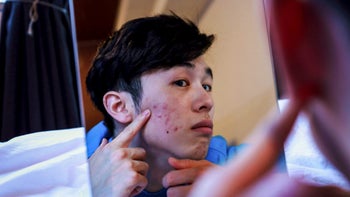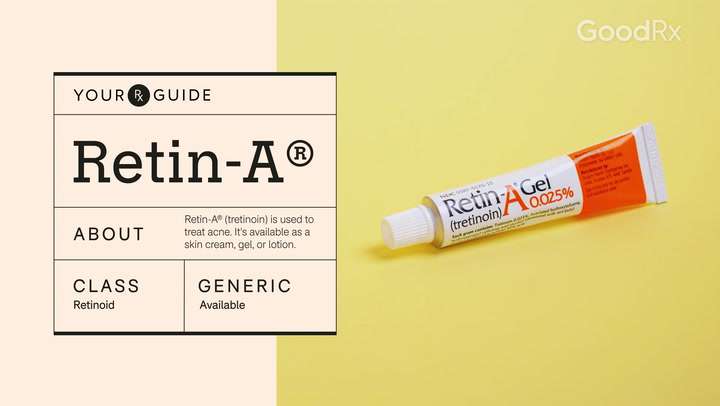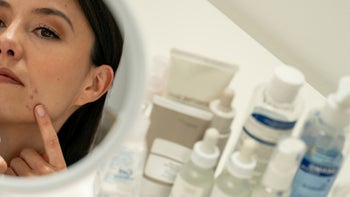
Tretinoin for Acne: 5 Side Effects and How to Manage Them
Key takeaways:
Topical tretinoin is a prescription-only medication that’s used to treat acne. It goes by different brand names, such as Retin-A, Atralin, and Avita.
Common tretinoin side effects include skin irritation, sun sensitivity, and skin discoloration. These are typically mild effects, and you can manage several of them by applying tretinoin properly and protecting your skin from the sun.
Some people shouldn’t use topical tretinoin. This includes people who are allergic to tretinoin products and pregnant women. And if you’re going to start trying to conceive, you may be advised to stop tretinoin at least one month beforehand.
Table of contents

Having acne can be frustrating at any age, but topical retinoids may be the answer. Tretinoin is a potent prescription retinoid that’s available as creams, gels, and lotions. You may know it by many names, such as Retin-A, Atralin, and Avita.
Although tretinoin has several benefits, it’s not without side effects. Skin irritation is a common complaint from treatment. This may vary between tretinoin products. But, remember, everyone’s skin is different. Your dermatologist can help you find the best option for you.
So, what tretinoin side effects are possible, and is there anything you can do to prevent them? Below, we cover what you should know about five tretinoin side effects.
1. Skin irritation
When you first start tretinoin, you may notice that your skin appears dry, flaky, or red. And if you have sensitive skin, these effects may appear stronger. Your acne may even get worse in the beginning. Don’t fret! This is normal and known as a skin purge or flare. Over time, both your acne and skin irritation should improve.
Tretinoin-treated skin should be handled gently. Here are ways you can prevent or lessen skin irritation from tretinoin:
Ask your dermatologist about starting with a lower-strength tretinoin product.
Start by applying tretinoin 1 to 2 times per week to ease into use.
Always clean your hands and face before applying tretinoin.
Use a pea-size amount for your whole face and don’t layer the product.
Moisturize well before and after using it.
Avoid applying tretinoin at the same time as other topical medications.
Steer clear of sensitive areas, cuts, or rashes.
Keep tretinoin away from the skin around your eyes and mouth.
Don’t pick or peel dry skin.
Try not to rub or exfoliate harshly.
Avoid applying makeup over irritated skin.
If skin irritation is still an issue, talk to your dermatologist about other tips for managing it during treatment.
2. Skin color changes
Tretinoin can change the color of your skin. For some people, this can be a desired effect of the medication. That’s because tretinoin is sometimes prescribed off-label to treat dark spots or melasma. In these cases, lightening the skin spots is the goal.
But other times, tretinoin may cause too much lightening (hypopigmentation) or darkening (hyperpigmentation) of your skin. For acne, it may be an unintended side effect of the medication.
Keep in mind: Not everyone will experience skin color changes from tretinoin. But if you notice any unwanted changes, notify your dermatologist. They may need to adjust your skin care regimen.
3. Sun sensitivity
The areas where you apply tretinoin can become more sensitive to the sun. That’s because tretinoin reduces the outer layer of the skin, which then allows sunlight in faster. This means you can get sunburned quicker and your skin can be more easily damaged. To combat this, sun protection is key while using tretinoin. Here are a few tips:
Stay inside when sun exposure is the strongest (10 AM to 4 PM)
Stick to shady areas when outside
Apply tretinoin at night and wash it off in the morning
Wear sunscreen (with SPF 30 or more) daily
Never use tanning beds or booths
Make sure to use protective clothing, hats, and sunglasses
4. Harm to a fetus during pregnancy
Topical tretinoin’s effects during pregnancy haven’t been well studied. But, animal studies have shown that tretinoin causes harm to the fetus. And we don’t know if tretinoin use during nursing is safe, either.
Because of this, most experts would recommend against using tretinoin if you’re pregnant. And if you’re planning to become pregnant, you may be advised to stop tretinoin at least one month before you start trying to conceive. Pregnant women also shouldn’t touch or handle the tretinoin with their bare hands. And if you’re nursing, talk to your dermatologist about safer alternatives.
We don’t know if there’s an increased risk of birth defects from men who use tretinoin when conceiving a child. But generally, the exposure risk is low in this case.
5. Allergic reaction
Tretinoin products may cause an allergic reaction. The risk of a true allergy to the main ingredient (tretinoin) is low. It’s actually the inactive ingredients that are more likely to cause an allergic reaction.
Because of this, it’s important to review all the ingredients of your tretinoin product with your dermatologist or pharmacist. This way you can check for any known allergies you may have to the medication components. Atralin, for example, contains fish protein (fish collagen hydrolyzates). If you have any allergies to fish, you shouldn’t take this version of tretinoin.
If you do have an allergic reaction, you should wash the treated area immediately. You may need to treat the area with Benadryl (diphenhydramine) or a topical steroid. If your symptoms seem severe or worsen, call your provider for further guidance.
Do not reattempt using tretinoin after an allergic reaction. Your dermatologist can discuss alternative options to treat your acne.
When should you contact your healthcare provider about tretinoin side effects?
Certain tretinoin side effects may be mild and managed easily with a few tweaks to your skincare routine. But there are situations when you should contact your dermatologist. They can provide ways to help reduce these effects. Ask for help if:
Your side effects continue or are worsening
Your side effects are severe
You can’t manage your side effects on your own
Your skin feels itchy and hot
You’re worried you might have a skin infection
Touching your skin feels painful
You develop hives or blisters
The bottom line
Common tretinoin side effects include skin irritation, skin color changes, and increased sun sensitivity where it’s applied. Tretinoin may also increase the risk of birth defects, so it’s typically avoided during pregnancy.
If you treat your skin gently, moisturize, and apply sunscreen daily, this can help improve your results with tretinoin. You’ll also want to avoid the sun and wear protective clothing to prevent damage to your skin.
If you have any questions about tretinoin side effects or how to manage them, talk to your dermatologist. Let them know if any side effects are getting worse, not going away, or start interfering with your quality of life.
Why trust our experts?



References
Bausch Health US, LLC. (2016). Atralin- tretinoin gel [package insert]. DailyMed.
Boswell, C. B. (2006). Skincare science: Update on topical retinoids. Aesthetic Surgery Journal.
Bryant Ranch Prepack. (2023). TRETINOIN- tretinoin gel [package insert].
Centers for Disease Control and Prevention. (2023). Sun safety.
Draelos, Z. D., et al. (2022). Vehicle formulation impacts tolerability and patient preference: Comparison of tretinoin branded lotion and generic cream. Journal of Drugs in Dermatology.
Mother To Baby. (2022). Topical tretinoin.
Was this page helpful?
Related Articles
Browse medications
View AllResearch prescriptions and over-the-counter medications from A to Z, compare drug prices, and start saving.



























